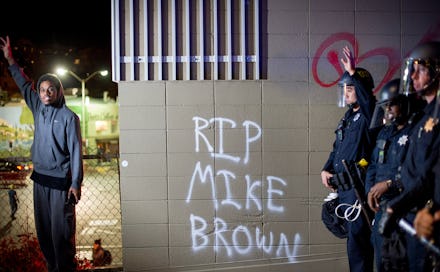One Tweet Perfectly Sums Up the Double Standard of White Male Privilege in America

As protests erupted across the country Monday night in response to a grand jury's decision not to indict Ferguson, Missouri, Officer Darren Wilson for the fatal shooting of 18-year-old Michael Brown, feelings that bubbled over in the wake of Brown's death in August reappeared — with a vengeance.
"In Ferguson, a wound bleeds," read the first line of an open letter from protesters. But the feelings that were sparked in August have now taken on a different shape.
As the verdict sank in, the intensity of the reactions, particularly those online, was palpable. Many talked about injustice, the pain of Brown's family and the state of race relations across the country. One of the most powerful, however, spoke of privilege — and the lack thereof — possessed by certain groups in America:
The message gets to the heart of things. It encapsulates many of the frustrations faced by minority groups: victim blaming, a lack of institutional accountability, power imbalances. It also speaks volumes about the empathy our society is willing to grant people when they fall into the category of "white male." When people who don't fit into that box are the focus — even if they're the victims — they fall by the wayside.
Brown's death isn't the only example of this. In the past couple of weeks Akai Gurley, 28, was shot and killed by police while walking down a dark stairwell with his girlfriend. Tamir Rice, 12, was killed by a first-year police officer in Cleveland because he had an airsoft gun in his hands. And the Rolling Stone detailed Wednesday, among other things, the failure of a university to punish an alleged gang rape of one of its own.
Go back even further and similar instances pile up. Yet there are still those out there who believe white privilege doesn't exist, or that black Americans are pulling the race card or that a woman who is raped somehow deserved it.
And yet when incidents like Sandy Hook and the Aurora, Colorado, movie theater shooting occur, the discussions tend to revolve around mental health: Why did this happen? How can we prevent it? How did we fail these people?
That's not to say these questions don't have a place; we can and must continue to work harder to prevent these situations before they happen. But when we're not asking the same things when women and people of color are concerned — and instead try to find any way possible way to place the blame on them — that's a problem.
If there's anything to be taken from the event of the past few weeks, it's this: Privilege is one hell of a drug.